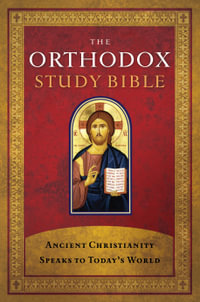
Emotional Monasticism
Affective Piety in the Eleventh-Century Monastery of John of Fécamp
By: Lauren Mancia, T. J. H. McCarthy (Editor), Stephen Mossman (Editor), C. E. Bene (Editor), Jochen Schenk (Editor)
Paperback | 1 June 2021
At a Glance
Paperback
$45.99
Aims to ship in 5 to 10 business days
When will this arrive by?
Enter delivery postcode to estimate
The first study of affective piety in an eleventh-century monastic context, it traces the early history of affective devotion through the life and works of the earliest known writer of emotional prayers, John of Fecamp, abbot of the Norman monastery of Fecamp from 1028-78.
Exposing the early medieval monastic roots of later medieval affective piety, the book casts a new light on the devotional life of monks in Europe before the twelfth century and redefines how medievalists should teach the history of Christianity.
Industry Reviews
'In this exciting study of F©camp, Lauren Mancia looks "under the hood" of an apparently ordinary eleventh-century Benedictine monastery. What she discovers of its rich and intense emotional life suggests new contours for the history of medieval "affective piety".'
Barbara H. Rosenwein, Professor Emerita, Loyola University Chicago
'Emotional monasticism is a ground-breaking work of revisionist history that promises to have a profound influence on the study of Christian devotion in the Middle Ages. Scholars have tended to locate the devotional disposition that we call "affective piety" in movements of mendicant, lay and female spirituality of the later Middle Ages. In this lucid and well-argued book, Lauren Mancia convincingly makes the case that affective piety was already at play in the eleventh century in male Benedictine communities, particularly at the abbey of F©camp in Normandy, where Abbot John fostered a devotional culture in his community with the aim of the emotional reform of his sinful brethren. Central to the reform was John's lifework, a treatise known as the Confessio theologica. In her study, Mancia delineates with great skill the devotional program of John's emotional reform through an analysis of his Confessio theologica, the influence of a specifically Benedictine culture on its formation, with special attention to John's career and use of manuscripts, the implementation of his reforming agenda at F©camp, the cultivation of these devotional principles by abbots active in the world and the legacy of the Confessio theologica beyond the monastic milieu of the eleventh century. This book will be of great interest not only to historians of medieval monasticism, but also to a much broader audience of readers interested in the history of premodern emotions and Christian piety.'
Scott G. Bruce, Professor of Medieval History, Fordham University
'Mancia gives us a perfect example of the contribution that can be made by the history of emotions and the necessity of exploring this approach, since in seeking to better understand the emotions of the past, not only do historians gain access to new knowledge, they can also question received ideas, as this study does in the area of affective devotion in monasticism. [...] A pleasure to read from start to finish.'
The History of Emotions in the Middle Ages
'The eleventh century and its monastic forms of affectivity are given much-needed recognition. Lauren Mancia has succeeded in giving John the place he deserves in the history of medieval spirituality. She has made him visible and contributed to our understanding of medieval culture.'
TMR
'[the book] showcase[s] Mancia's confidence and competence across an impressive range of relevant disciplines and approaches, from theology and philosophy to historical and literary analysis...Mancia's inspired discussion of the visual imagery that can be seen in some of F©camp's manuscripts made around the time of John's abbacy is one of the book's highlights....this is a fine book which speaks to a wide variety of subjects and cross-disciplinary interests with authority and thoughtfulness...Mancia has done herself and John of F©camp proud with a provocative study that is not revisionist in the aggressive sense, but which picks its battles carefully and, as a result, encourages future conversation.'
Benjamin Pohl, Medieval Europe, University of Bristol
'This is a fine book which speaks to a wide range of subjects and cross-disciplinary interests with authority and
thoughtfulness.'
Early Medieval Europe
ISBN: 9781526155917
ISBN-10: 1526155915
Series: Artes Liberales
Published: 1st June 2021
Format: Paperback
Language: English
Number of Pages: 288
Audience: Professional and Scholarly
Publisher: Manchester University Press
Country of Publication: GB
Dimensions (cm): 21.6 x 13.8 x 1.5
Weight (kg): 0.34
Shipping
| Standard Shipping | Express Shipping | |
|---|---|---|
| Metro postcodes: | $9.99 | $14.95 |
| Regional postcodes: | $9.99 | $14.95 |
| Rural postcodes: | $9.99 | $14.95 |
How to return your order
At Booktopia, we offer hassle-free returns in accordance with our returns policy. If you wish to return an item, please get in touch with Booktopia Customer Care.
Additional postage charges may be applicable.
Defective items
If there is a problem with any of the items received for your order then the Booktopia Customer Care team is ready to assist you.
For more info please visit our Help Centre.
You Can Find This Book In
This product is categorised by
- Non-FictionHistoryGeneral & World History
- Non-FictionHistoryRegional & National HistoryEuropean History
- Non-FictionHistoryEarliest Times to Present DayEarly History from 500 to 1500Medieval History
- Non-FictionReligion & BeliefsChristianityChristian Institutions & OrganisationsChristian Communities & Monasticism







![NRSV Catholic Bible Gift Edition [White] : Holy Bible - Thomas Nelson](https://www.booktopia.com.au/covers/200/9780785230380/2211/nrsv-catholic-bible-gift-edition-white-.jpg)











![NIV Holy Bible Soft Touch Edition [Black] - Zondervan](https://www.booktopia.com.au/covers/200/9780310450474/null/niv-holy-bible-soft-touch-edition-black-.jpg)




